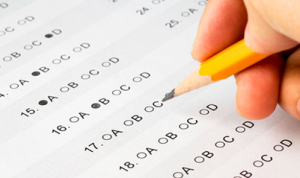
Standardized testing is very stressful for students and can cause and bring out anxiety for everyone. They are here to test your skill on knowledge on a variety of subjects like math, reading, etc. It is extremely important to not worry, take your time, and just relax when taking these tests. Picture by public domain.
by Esther Animalu, contributing reporter

Taking exams that test students abilities on an array of topics don’t accurately demonstrate what students have learned. Whether its with the New York State English Language exam (ELA Exam) or even the SATs, students are left frustrated and don’t realize that there could be an alternative.
Students have to subject themselves to all the long passages, embedded field test questions, critical studying, heavy pressure, and mounds of stress that state exams brings. Due to this, parents, faculty, staff, and students are second-guessing the necessity of the rigorous year round state exams.
Furthermore, as stated by Lohud.com, a vast majority of parents from across New York State routinely boycott the state exam by withdrawing their children from school in order to avoid taking the test.
These exams develop a common core curriculum that teachers have to follow. This restricts teachers from teaching creative skills to the students, such as using games to engage students and make the topic appealing.
Some students feel that standardized testing is unfair because many of them learn differently. While some students learn better by answering test questions, others learn better through hands on activities, such as visual examples or even through class discussions.
“I think that the state ELA and Math tests are not a good way to assess students. Some unique techniques are helpful for certain students. For example a student might know the answers, but mess up on the bubbling,” freshman Autumn Legunas said.
However, many would protest that Common Core Standardized Tests gives numerous students the ability to enhance their problem solving skills by inquiring questions that require strategic thinking and constant rechecking. As a result, the tests increase a child’s ability to recognize and accurately resolve dilemmas in the real world as well.
According to the Washington Post, one top-notch alternative is conducted by the New York Performance Standards Consortium, an alliance of 28 public high schools. Schools in the Consortium use performance-based assessments instead of standardized exams.
Consortium schools focus on project-based learning. All consortium programs require students to successfully complete four performance-based assessment tasks (PBATs). These consist of an analytic essay, a social studies research paper, a science experiment, and an applied mathematics problem. They incorporate both written and oral components.
This is one of the few alternatives as opposed to the tiresome New York State Math and English Language Arts exam. Studygs.net confirms that changes like these are proven to have fewer stress on students. However, there are other opportunities in which a student can be tested on their individual strengths.
According to nystoptesting.com, the NYS Assessments that are forced upon children across the Empire State contain “embedded field tests,” which are “trial” questions to see if they make a good question for future examinations. The repercussions of this can cause students to lose track of time, because they may be frustrated by a question that doesn’t count on the test.
Many teachers and students portray the New York State Math and English Language Arts common core exam as the key to moving up a grade level. This is causing students to value grades more than they value knowledge. Students now work with one clear thought. ‘I need to pass’ or ‘I need to get this grade’ as they move from test to test without trying to learn.
“I think the Common Core is having both positive and negative effects on student education. I believe the overall idea behind the development of the Common Core was a good one however the implementation of it hasn’t been handled as well. The Common Core has helped to increase the level of rigor in my teaching as well as help me look at connections between the material differently than I had before,” geometry teacher Mrs. Johnson said.
The competition and stress that is placed on the child to do well also increases that child’s incentive to cheat. Not to mention, the fact that exams give students no skills for the practical application of knowledge in the real world.
The New York State Math and English Language Arts common core exams should be replaced with another method of assessing one’s know-how. The annual testing is not always an accurate reflection of some students’ understanding of what they’ve learned throughout the year.
Students across the board perform better in different scenarios. Many people believe that as a society, the state should be looking for different ways of ‘Knowledge Reflection’ that takes competition and stress out of the picture for today’s students. Instead of generic exams, the state should be creating tests that highlights each student’s individual strength.
“I agree that we should look for a different way to assess students fairly because, it’s not fair how we have all this pressure put on us while we’re just trying to pass our grade and move on. We shouldn’t have the state exam determine whether or not we pass. Our projects, quizzes, tests, effort, participation in school should count more than a test that seems unfair,” freshman Kevin Cosgrove said.
All in all, as a student proceeds to move into the next grade level, they will be challenged with new complex learning material. In similarity, the New York State Math and the ELA exam is expected to become more challenging as well. However, the earnest criteria and procedures that schools and students must meet is creating an obsession to pass rather than an obsession to learn.
As a result, many people are seeking a silver lining, a balance between assessing the intectural skills of each student’s mind and the quality and fairness of the tedious state exam itself.